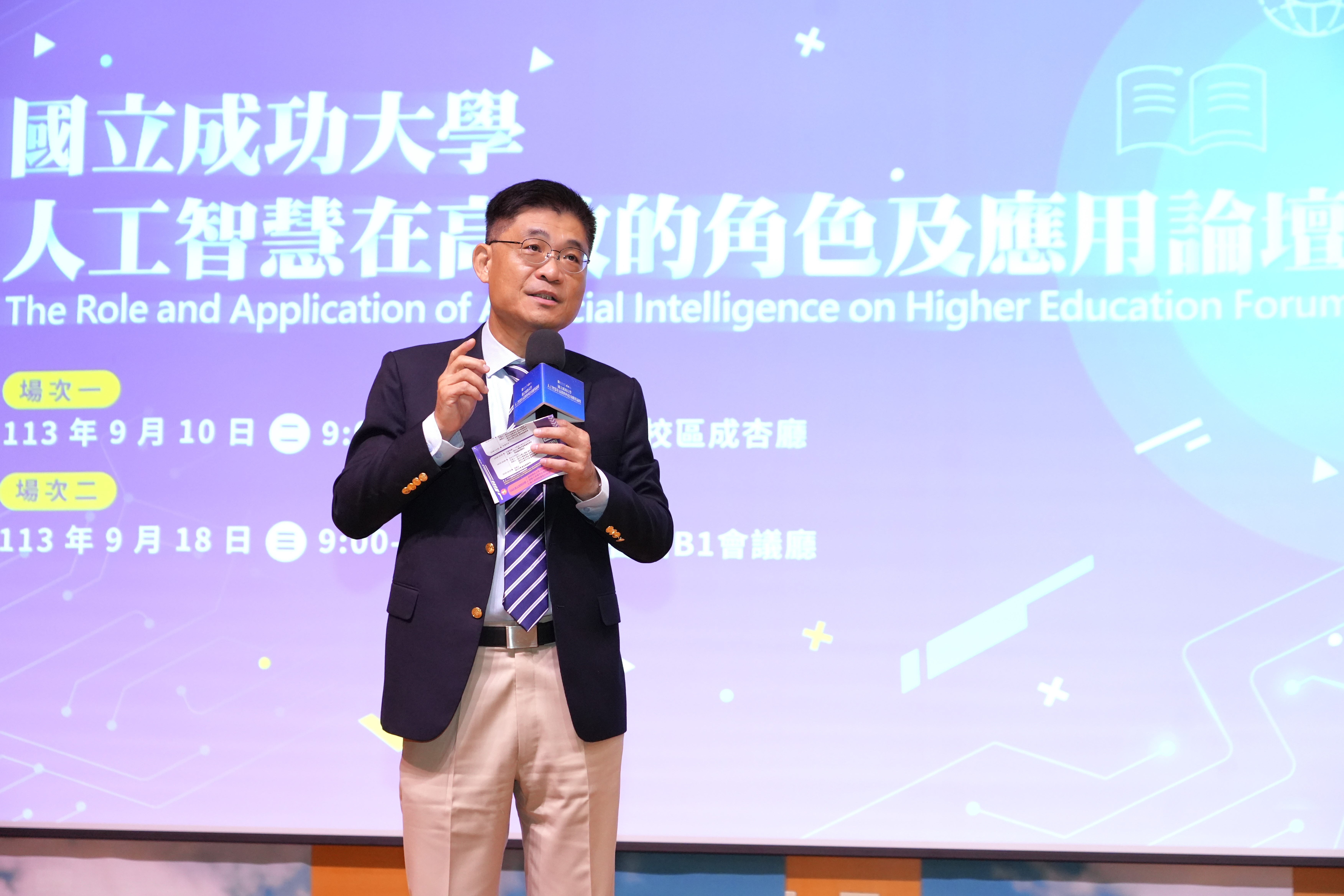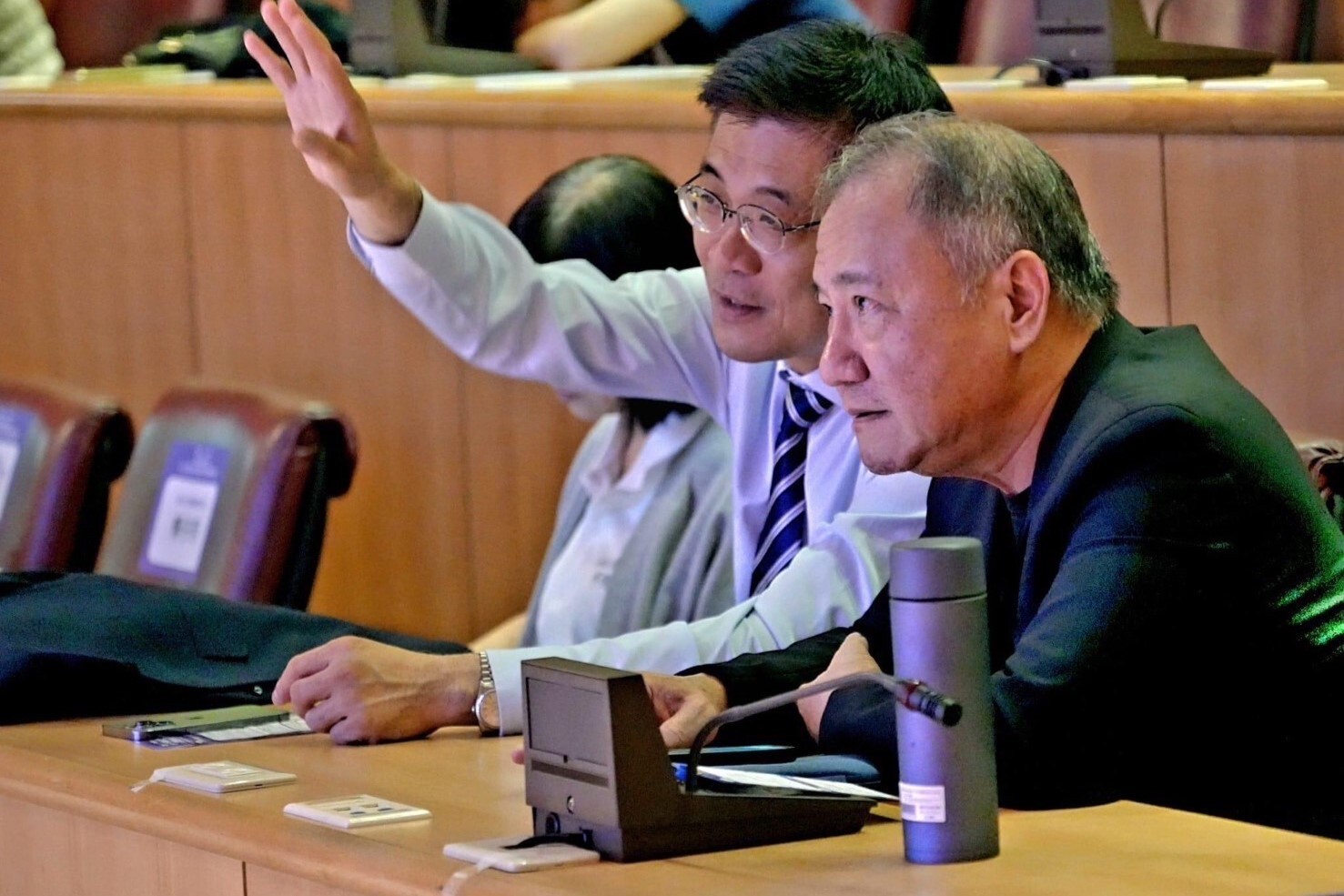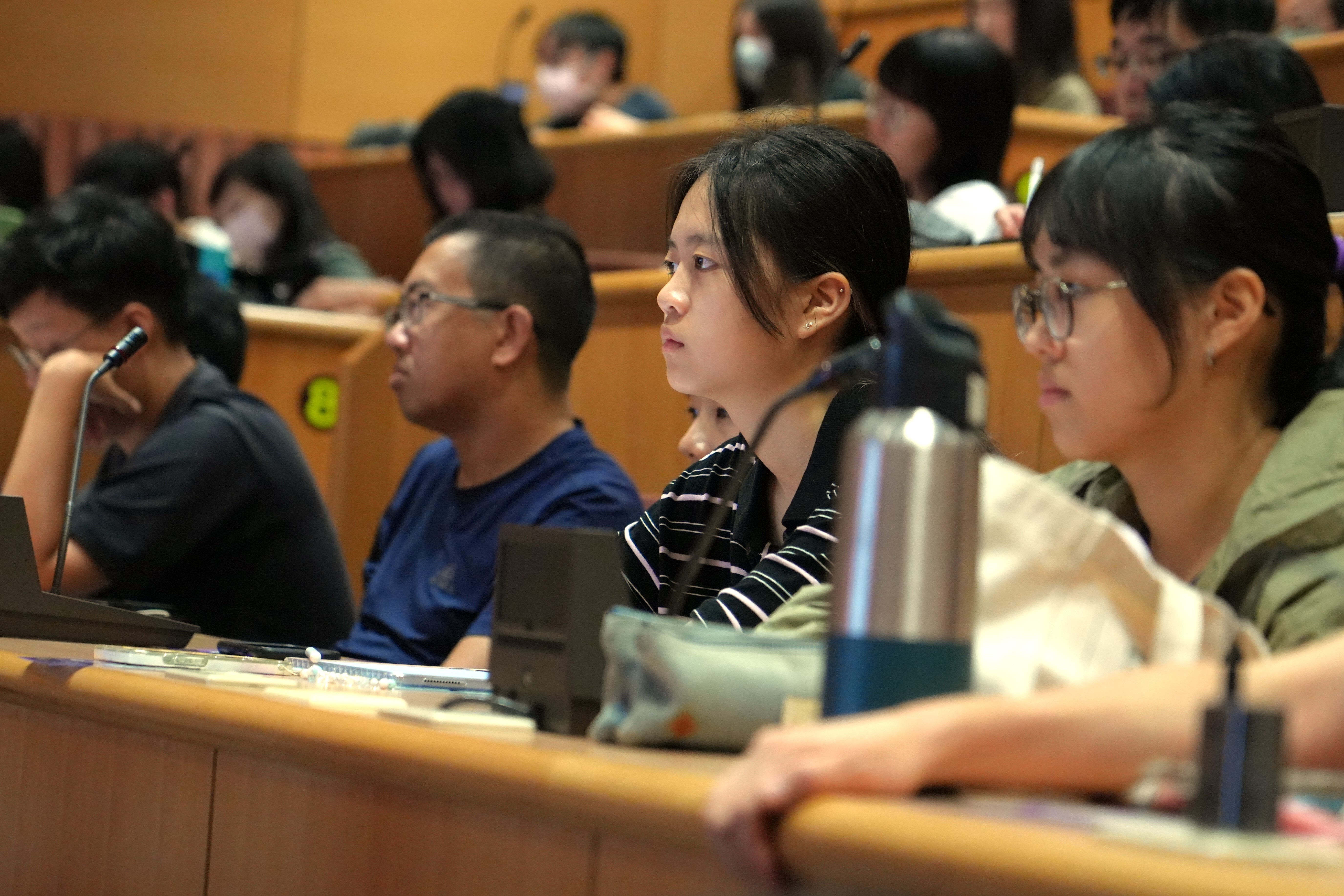The Role and Application of Artificial Intelligence on Higher Education Forum Concludes Successfully with Enthusiastic Participation from Faculty and Students Exploring the Future of AI
Written by Elysee Chung. Image credit to NCKU News Center.
The Office of International Affairs at National Cheng Kung University (NCKU) held the second session of the “The Role and Application of Artificial Intelligence on Higher Education Forum” on September 18 in NCKU Library Conference Center. This forum continued the discussions from the first session on September 10, focusing on the application of AI in aesthetic design and performing arts. It also explored the impact of large language models on language, ethnicity, fairness, as well as legal and social systems, offering multiple perspectives on the future development of higher education. Over 800 faculty and students participated in this year’s event, collectively exploring the future of AI.

President Meng-Ru Shen stated that the impact and challenges of AI on higher education are increasing daily, and NCKU will take more proactive measures to address them.
In his opening speech, NCKU’s President Meng-Ru Shen (沈孟儒) stated that the impact and challenges of AI on higher education are growing. Since last year (2023), the university has conducted assessments and made adjustments each semester, and this year, they once again convened experts from various fields for a two-day forum. During the first session of the forum on September 10, topics included the application and development of AI in higher education across different countries and how AI technology can be used in teaching to promote human well-being. The theme of the September 18 session covered the application of AI in aesthetics, design, and performing arts, and explored potential inequalities caused by AI through recent cases in technology law and healthcare. According to President Shen, Taiwan is at a crossroads between becoming a major player or a colony in the AI era. Facing the impact of AI, NCKU will take more proactive measures, including introducing a digital governance checklist to assess the university’s digital indicators starting next semester, and providing faculty, students, and staff with more diverse and convenient AI tools to comprehensively improve teaching outcomes and administrative efficiency.

Professor Shyh-Nan Liou (right) was invited to share insights during the session of “Application of Artificial Intelligence in Aesthetics and Design.”
Professor Shyh-Nan Liou (劉世南) is the Director of Taiwan Design Research Institute and Distinguished Professor at NCKU Institute of Creative Industry Design. In the keynote speech, “Application of Artificial Intelligence in Aesthetics and Design,” he used print advertising as an example to illustrate the evolution of technology, emphasizing that the purpose of artistic creation is not solely to pursue realism but also to express human emotions. Professor Liou shared the application of AI in fields such as digital democracy and precision medicine, noting that the impact of AI is comparable to the second industrial revolution. He concluded that technology is a tool to realize the values of human civilization. It is a crucial challenge for individuals today to learn to harness AI and other technologies, rather than being controlled by them.

Associate Professor Wei-Chien Ma (馬薇茜) from the NCKU Institute of Art Studies shared insights during the session of “The Application of Artificial Intelligence in Performing Arts Creation.”
In the keynote speech “The Application of Artificial Intelligence in Performing Arts Creation,” Associate Professor Wei-Chien Ma (馬薇茜) from the NCKU Institute of Art Studies shared insights from the teaching practices of the Institute of Art Studies and the MA Program in Drama. She discussed how AI is used in art creation, covering topics such as the humanistic perspective, art exhibitions, and interdisciplinary collaboration. She guided students in applying AI to enhance performing arts, theater curation, cultural pathways, and historical humanities. By integrating humanistic knowledge with artistic creation, she cultivated their creative thinking and sense of social responsibility.
The comprehensive discussion session was introduced by Director Tzu-Fun Fu (傅子芳) of the NCKU Library, who addressed the impact and opportunities brought by the rise of AI technology in areas such as knowledge management, data retrieval, and academic resource provision for university libraries. Fu emphasized how NCKU Library has responded to AI’s growing influence by showcasing its development and applications in higher education across various countries. She also highlighted advances in generative AI for point-of-care testing (POCT) and showcased student projects, underscoring the principle of “using technology rather than being used by it.”
Associate Professor Yu-Chen Shu (舒宇宸) from the Department of Mathematics explained that current generative AI models are largely probability-based, and he stressed that human-machine collaboration relies heavily on human discernment. He emphasized that the goal of education is to teach students to critically engage with AI.
Associate Professor Chung-Ping Young (楊中平) from the Department of Computer Science and Information Engineering shared how he integrates humanities with information technology, such as using AI to revive the language and culture of the Siraya people of Tainan and applying image comparison technologies to trace the missionary path of Dr. James Laidlaw Maxwell from 150 years ago. Through these courses, higher education connects with community needs, fostering coexistence with AI amid the unstoppable progress of technology.
Associate Professor Chi-Hua Yu (游濟華) from the Department of Engineering Science opened his speech with a review of the history of computer development, highlighting that breakthroughs in AI are largely driven by advances in computational power. He also discussed an innovative approach of converting protein structures into music for AI training and emphasized that AI outputs are shaped by human instructions, with values assigned by humans. Additionally, he demonstrated how information models are being used to diagnose dengue fever symptoms, enhancing the efficiency and reliability of frontline medical personnel.
In the keynote speech “Fairness in Large Language Models (LLMs),” Assistant Professor Shao-Man Lee (李韶曼) from the Miin Wu School of Computing highlighted that current AI systems often display biases favoring Western culture and aesthetics. Experiments conducted across different languages and cultural contexts revealed varying outcomes, such as LLMs showing a preference for male and older perspectives when the context was set in East Asian countries. These findings reflect the long-standing inequalities caused by cultural hegemony, where certain groups are easily excluded from LLM representations. This exclusion risks steering society toward a single, dominant viewpoint, which is detrimental to diverse interactions and mutual understanding. Lee proposed that international human rights regulations should include Cultural Impact Assessments (CIAs) to ensure AI systems respect and incorporate the cultures of different ethnic groups around the world.

Over 800 enthusiastic participants were attracted to “The Role and Application of Artificial Intelligence on Higher Education Forum.”
The afternoon’s comprehensive forum is introduced by Professor Jon-Fan Hu (胡中凡) from the Department of Psychology. He began with a reflection on current events, emphasizing that AI begins with human nature. While people benefit from AI, they should also reflect on the broader impact of technology. The rise and fall of AI reflect human needs rather than the inherent goodness or badness of AI itself. Hu led the audience to think about the differences between AI and humans, sharing experiments in psychology on AI creativity and false memories, and argued that AI should be taught to think for humanity to prevent harm to human communities.
Professor Chang-Ching Lin (林常青) from the Department of Economics compared gender stereotypes in reality and generative AI, finding that LLMs replicate human gender stereotypes rather than present objective data, and even amplify stereotypical feminine traits. Professor Lin concluded that AI’s gender biases are not just technical issues but societal ones.
Associate Professor Wan-Ju Yeh (葉婉如) from the Department of Law extended the discussion of AI concerns, analyzing how the European Union’s recently implemented Digital Markets Act and Digital Services Act regulate digital giants in the digital economy, ensuring platform governance and protecting users’ rights, while maintaining fairness and openness in digital society. In contrast, Taiwan’s legal framework still tends to favor self-regulation.
Associate Professor Harry Yi-Jui Wu (吳易叡) from The Cross College Elite Program traced the evolution of humanity’s perceptions of technology from the post-World War II 1940s. He noted that people of color were only included in medical discussions about a decade ago, and AI has overlooked those with low socioeconomic status or rare diseases, depriving them of timely medical assistance. Wu also mentioned the World Health Organization’s attempt to study schizophrenia in different regions and languages, which faced criticism, revealing the inevitable biases in healthcare and emphasizing that the size of big data databases is secondary.
The forum concluded with a special thanks from the Vice President for International Affairs, Sun-Yuan Hsieh (謝孫源), to the participating faculty and students. He reiterated NCKU’s commitment to AI application and education and announced that the forum would continue next semester in a different format. Over the two-day event, more than 800 people participated, and 23 teachers shared the latest AI applications and insights. The event also integrated the interactive tool Slido, allowing attendees to ask speakers questions via their phones in real-time. Through this forum, the university aims to explore the role and application of AI in higher education in depth, equipping faculty and students with the knowledge and skills needed for the AI era, and integrating digital governance into campus life through micro-courses on AI.
Provider:
NCKU News Center
Date:
2024-10-09
Click Num:
Share

